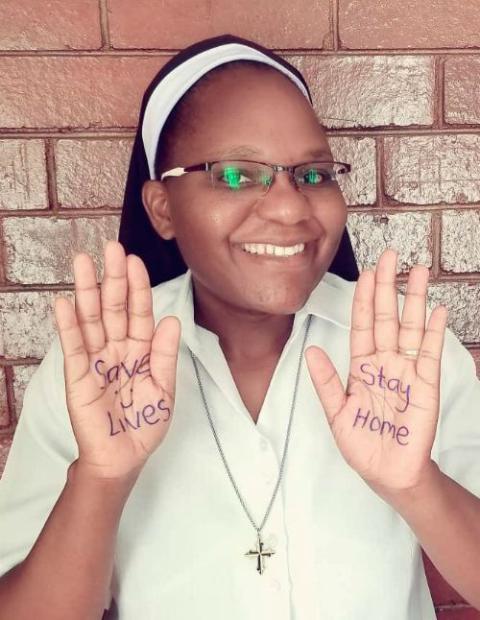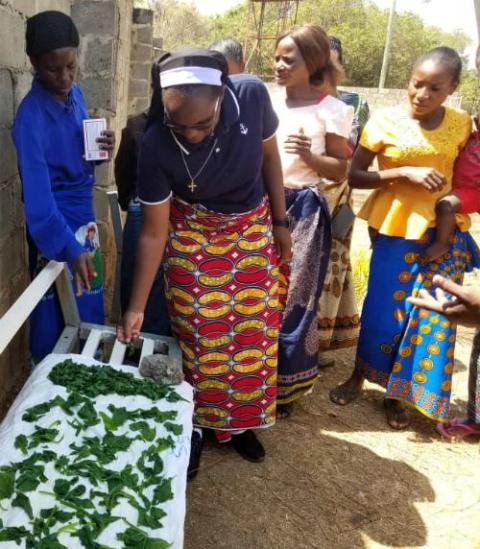
Dominican Sr. Astridah Banda, right, and other sisters get ready for the COVID-19 program on Radio Maria: Yatsani Voice in Lusaka, Zambia. By using the radio to spread her message, Banda can reach more people who otherwise may not have access to other media platforms such as television or the internet. (Provided photo)
As the world continues to grapple with the surge in numbers of confirmed cases of COVID-19, religious sisters in Africa have moved in to support their governments' efforts to combat the pandemic in areas they serve.
In Zambia, the sisters are using a radio talk show in local languages to inform people about the coronavirus. Sr. Astridah Banda, a member of Dominican Missionary Sisters of the Sacred Heart of Jesus, and sisters from other congregations are working together to ensure that educational messages on the novel coronavirus reach the communities in rural areas where there is little access to information.

Dominican Sr. Astridah Banda displays one of the key COVID-19 messages on her hands during a campaign to encourage people to stay safe. (Provided photo)
"When COVID-19 hit the world, it came as a shock to me," Banda told Global Sisters Report. "I could not just sit and do nothing. I had to think of a way to help people, and that's why I thought of educating the people I serve about the pandemic."
The African nun, who is also a social worker, started a radio show called "COVID-19 Awareness Program" at Radio Maria: Yatsani Voice in the capital, Lusaka, in the bid to ensure that information on how to prevent the virus reaches everybody.
During the talk show, Banda and other sisters use local languages to precisely inform people about the pandemic. By using the radio to spread their message about the virus, they can reach more people who otherwise may not have access to other media platforms, such as television or the internet, said Banda, adding that access to information is always key to solving problems.
"Timely information is always key as it helps people to make informed decisions," she said.
The program, which now reaches 1.5 million people, was initially funded by Catholic Relief Services, but the sisters have also received some funding from Alight, a humanitarian organization, to continue with the radio program. They also use the funds to buy and distribute face masks, soap, and hand-washing facilities, and pamphlets with key COVID-19 messages, Banda said.
The Dominican sister said she feels that their COVID-19 messages have slowed down the rate of infection in the country. As of Nov. 16, the southern African country with a population of more than 17.8 million people has reported only 17,187 COVID-19 cases and 353 deaths.
Her work of fighting the pandemic has been praised and recognized globally. Wealthy philanthropist Bill Gates recently listed her among seven unsung heroes of the pandemic.
"When the coronavirus arrived in Zambia, [Banda] noticed that most of the public health bulletins about social distancing, masks, and handwashing were being written in English," Gates wrote on his blog. "While English is an official language in Zambia, many people speak one of Zambia's seven local languages and they were missing out on this critical information."

Dominican Sr. Astridah Banda trains caregivers on food preservation and its importance in Lusaka, Zambia. The training helps caregivers to improve child nutrition in schools. (Provided photo)
GSR: Tell us more about your ministry.
Banda: I am a project manager for a project called SCORE ECD: Strengthening the Capacity of Religious Women in Early Childhood Development. I work for the Zambia Association of Sisterhoods at the secretariate.
My work involves building capacity in community health volunteers and mothers who provide key early childhood development messages to caregivers so that children under 2 attain developmental milestones. The key messages consist of health, nutrition and WASH [water, sanitation and hygiene] messages as well as parenting and stimulation messages [that encourage someone to grow, develop or become active].
When did you start hosting the radio show about sensitizing the community about COVID-19, and what do you like most about it?
The radio program started in March with Radio Maria: Yatsani Voice in Lusaka. What made me happy about our live radio show was speaking to the local community in the local language and providing them with timely key COVID-19 messages that changed their lives and their communities. I enjoyed when callers phoned in the week after and shared what changes they made to prevent the spread of the virus and keep themselves and their families safe.
Do you know who your followers are?
The radio station has approximately 1.5 million listeners. After three months of our live broadcasts, we expanded the radio programs to three more provinces, where sisters got on the radio in their local languages and provided preventive messages to their communities, as well. The children participated in providing live radio programs to engage their fellow young people.
Advertisement
Somehow, people tend to trust sisters when they provide messaging of such a nature. Not only was the program based on COVID-19 messages, but also on counseling and psychosocial support. We could support our callers with spiritual support as well on issues that were affecting them because of the virus, like lack of money, loss of loved ones, and boredom.
We got so much support from the radio stations, which would even give us extra airtime for free.
You were recognized as a hero by Bill Gates. What does this mean to you and your ministry?
I must say this has been a great honor for me and very humbling. I went about with my program with a view of keeping the curve low and keeping my community safe. Meanwhile, someone saw my little effort and recognized me. I am really humbled.
I am convinced that sisters are doing great works, and I feel that if I can represent the sisterhood, then our service to the people of God is recognized.

Sr. Astridah Banda and community health workers distribute facemasks to residents in Zambia and talk with them about COVID-19. Banda started a radio show called "COVID-19 Awareness Program," which focuses on defusing misinformation about the pandemic. (Provided photo)
On your show, you translate coronavirus messages in different languages. How did you learn the languages?
We have translated at least six local languages on our programs. I can speak three of these, though I can understand most of them. However, the languages are shared among panelists, who are usually three per day, and callers are free to phone in using any language they are comfortable with.
This makes our listeners love the program so much because they can express themselves in a language they are comfortable with.
I invite different sisters who are able to speak different languages, and hence, each week, I ensure that we have a team that can speak at least three different languages.
Were you holding similar shows even before the pandemic? Or did this start after the outbreak of the coronavirus?
I was conducting some advocacy sessions on early childhood development, but not as frequently as the COVID-19 messages, mainly because COVID-19 prevention was urgent and important. During the advocacy radio program, we try to encourage our communities to nurture early years of children so that we have smart, strong and healthy children who not only survive but also thrive. Our hope for the advocacy program is to see an increase in early childhood development intervention at community and national levels.

Sr. Astridah Banda, who is also a social worker, provides literary classes to children in rural Zambia who have not started formal school to encourage an interest in learning. (Provided photo)
How do the media connect to your congregation's charism? Do you get support from the congregation, or is it a personal thing?
Our charism is evangelization. We praise, bless and preach God's goodness everywhere. Reading the signs of times is a Dominican culture, and if preaching is by media, then why not? I have great support from my congregation, as most of the work has been done with sisters within the congregation and in different communities.
My congregation went flat-out to distribute COVID-19 supplies to our communities to keep them safe and conducted mobile sensitizations to prevent the spread of the virus even to markets. We conducted radio programs together with the sisters, and they have been very supportive. We are blessing and preaching to our people. This for us is true evangelization.
What's the next step for you and your ministry?
Having provided key COVID-19 messages in local languages to at least four provinces of the country, we are looking forward to ways of helping our communities cope with post-COVID-19 effects. We are seeking support on providing livelihood support for our communities to bounce back and live like they did before the coronavirus pandemic.
[Doreen Ajiambo is the Africa/Middle East correspondent for Global Sisters Report. Follow her on Twitter: @DoreenAjiambo.]





